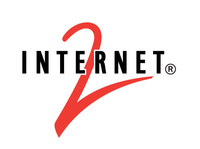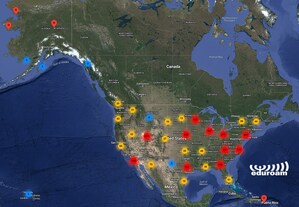HUNTSVILLE, Ala. and WASHINGTON, Dec. 1, 2020 /PRNewswire/ -- The Minority Serving-Cyberinfrastructure Consortium (MS-CC), in collaboration with Internet2, is leading a national effort to help minority-serving institutions identify the science, engineering, health, social science, and humanities education and research priorities that call for increased access to and use of data management and computing resources by the higher education community.
A key component of this collaboration is supporting the dissemination of a survey among presidents, administrative leaders, IT groups, faculty, and staff at nearly 485 historically Black colleges and universities (HBCUs), Hispanic-serving institutions (HSIs), and minority-serving institutions (MSIs) to collect a critical data set aimed at guiding priorities and enabling collaborative initiatives in support of cyberinfrastructure improvements. To date, a survey alert message was sent to more than 5,000 individuals to raise awareness among potential participants. The survey will remain open until December 11, 2020.
"The consortium is a collaboration that has grown over the past two years and is increasingly focused on elevating the cyberinfrastructure of all minority-serving institutions," said Dr. Deborah Dent, chief information officer at Jackson State University, and a member of the MS-CC leadership council. "This survey will give us the data set necessary to not only make our case for resource investment, but to strengthen the collaborative network of HBCUs, HSIs, and MSIs."
Dr. Damian Clarke, chief information officer at Alabama A&M University, and a member of the MS-CC leadership council, notes that the survey has garnered responses from a wide range of participants and hopes to see continued engagement from HBCUs, HSIs, and MSIs.
"This survey is much like the U.S. Census. You want to be counted. You want your institution to be counted. The data collected will impact funding, research, and your institution's ability to educate, collaborate, and compete for years to come," added Dr. Clarke. "Even though 'cyberinfrastructure' is a word mainly used in the IT realm, this is not an IT-centric survey. Presidents, administrators, faculty, and staff are all encouraged to respond. They each bring unique and important perspectives."
Tribal colleges and universities (TCUs) are also conducting a similar survey through an effort led in collaboration with the American Indian Higher Education Consortium (AIHEC). Data from the TCU survey will be combined with the MS-CC survey to present an integrated picture of data and computing matters across U.S. minority-serving institutions.
The survey effort by MS-CC is supported by Internet2, a non-profit, advanced technology consortium providing a secure high-speed network, cloud solutions, research support, and services tailored for the nation's researchers, scholars, and learners.
"The Minority Serving-Cyberinfrastructure Consortium is leading a timely national effort in helping expand cyberinfrastructure, and this survey is an important step in building a coordinated effort that puts the needs of minority-serving institutions at the forefront of these discussions," said Ana Hunsinger, vice president for community engagement at Internet2. "We're honored to be working alongside our colleagues at MS-CC and share in their commitment to enabling discovery and scholarship, and helping researchers leverage computing and data resources."
EDITOR'S NOTE: WayMark Analytics, a social impact company that conducts mission-driven stakeholder mapping surveys, developed the MS-CC survey and will be analyzing the results. Community members of HBCUs, HSIs, and MSIs interested in participating in the survey should contact Joel Cutcher-Gershenfeld at joel@waymarksystems.org.
About Minority Serving-Cyberinfrastructure Consortium
MS-CC envisions a transformational partnership to promote advanced cyberinfrastructure (CI) capabilities on HBCU, HSI, TCU, and MSI campuses, with data; research computing; teaching; curriculum development and implementation; collaboration; and capacity-building connections among institutions. The consortium emerged from a National Science Foundation funded pilot project that was awarded through Clemson University: NSF OAC #1659297 "CC* Cyber Team: Cyberinfrastructure Empowerment for Diverse Research, Scholarship, and Workforce Development (CI Empower)." This included South Carolina State, Claflin University, Jackson State and Morgan State Universities, which supported MS-CC meetings, visioning, and chartering efforts. A working group of 20 participants formed from a workshop at Georgia Tech in June 2018 that helped create a chartering document. For more information, visit www.ms-cc.org
About Internet2
Internet2® is a non-profit, member-driven advanced technology community founded by the nation's leading higher education institutions in 1996. Internet2 serves 322 U.S. universities, 60 government agencies, 43 regional and state education networks and through them supports more than 100,000 community anchor institutions, close to 1,000 InCommon participants, and 56 leading corporations working with our community, and 70 national research and education network partners that represent more than 100 countries.
Internet2 delivers a diverse portfolio of technology solutions that leverages, integrates, and amplifies the strengths of its members and helps support their educational, research and community service missions. Internet2's core infrastructure components include the nation's largest and fastest research and education network that was built to deliver advanced, customized services that are accessed and secured by the community-developed trust and identity framework.
Internet2 offices are located in Ann Arbor, Mich.; Denver, Colo.; Washington, D.C.; and West Hartford, Conn. For more information, visit www.internet2.edu or follow @Internet2 on Twitter.
SOURCE Internet2

Related Links
WANT YOUR COMPANY'S NEWS FEATURED ON PRNEWSWIRE.COM?
Newsrooms &
Influencers
Digital Media
Outlets
Journalists
Opted In







Share this article